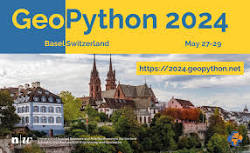AquaINFRA Event
GeoPython 2024
Start: May 26th, 2024
End: May 28th, 2024
The GeoPython 2024 conference will be held from May 27th to 29th, Basel, Switzerland. This will be the 9th edition of GeoPython and the event will host a global assembly of Python enthusiasts, geospatial experts, and tech innovators eager to delve into the cutting-edge realm of GeoPython.
Why Attend GeoPython 2024?
🌍 Global Participation: With participants from over 30 countries, GeoPython stands as a premier international event fostering collaboration and knowledge exchange.
🚀 Innovation Hub: Experience an immersive celebration of cutting-edge advancements, igniting innovation in GIS, mapping, Earth sciences, machine learning, and more.
🤝 Boundary-Defying Collaboration: Break geographical barriers and collaborate with professionals, researchers, and Python aficionados passionate about shaping the future of geospatial technology.
Main Topics at GeoPython 2024:
🗺️ GIS/Mapping
🌐 Geography/Geophysics/Geodesy/Geomatics
🌏 Earth Sciences/Environmental Sciences
📊 Geovisualization
🏙️ Smart Cities
🌐 Spatial Data/Geodata
🌐 Geospatial Webservices
📈 Big Data
🔄 Data Processing
🗃️ (Spatial) Databases
👁️ Computer Vision
🌐 Remote Sensing
🖼️ Image Processing
🧠 Machine Learning/Deep Learning
📱 Mobile Mapping
🏠 Indoor Mapping and Modelling
Key Dates:
📅 **Conference:** May 27-29, 2024
🚀 **GeoHack Hackathon:** May 30-31, 2024 (details coming soon)
AquaINFRA Participation:
On Wednesday 29th May, AquaINFRA partner, Pekka Latvala, a GIS expert at the Finnish Geospatial Research Institute FGI, will present on using Python to enhance geospatial metadata queries. The Python-based web service employs SPARQL queries to retrieve related terms from an RDF-based ontology or thesaurus data, offering improved search capabilities.
As part of the AquaInfra project, the Data Discovery and Access Service (DDAS) focuses on federated metadata search and data access. Latvala's Python-based web service within DDAS enhances metadata queries by providing related terms search, utilizing SPARQL queries on RDF-based ontology or thesaurus data. The service incorporates django, django REST framework, and SPARQLWrapper libraries, with RDF data hosted on the Apache Jena Fuseki SPARQL server. Currently using GEMET thesaurus data, the service allows users to control the inclusion of linked concepts in the search results.
Location
FHNW - University of Applied Sciences Northwestern Switzerland


